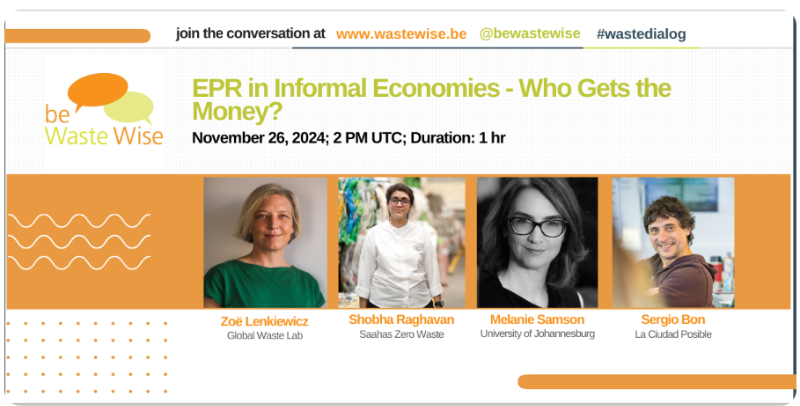- Resource recovery
- Safety of reuse aspects, legislation, guidelines, policies
- EPR in Informal Economies – Who Gets the Money?; Nov 26 07:30 PM IST
EPR in Informal Economies – Who Gets the Money?; Nov 26 07:30 PM IST
3591 views
- paresh
-
 Topic Author
Topic Author- Moderator
- Budding WASH researcher, especially interested in governance, public policy, finance, politics and social justice. Architect, Urban & Regional planner by training, Ex. C-WAS, India.I am a patient person :)
Less- Posts: 383
- Karma: 7
- Likes received: 143
Re: EPR in Informal Economies – Who Gets the Money?; Nov 26 07:30 PM IST
Sharing this related event titled EPR in Informal Economies – Who Gets the Money? organised by Be Waste wise
Extended Producer Responsibility is being promoted as a silver bullet, but its effectiveness is far from proven. While in Europe, there may be a small number of organisations collecting and preparing materials for recycling, in markets where waste management services are not formalised, this work is done by tens of thousands of people – often in poor conditions and for excruciatingly little income. So, where brands are paying into EPR systems, but the workers are not feeling any benefit yet, what needs to change?
Zoë Lenkiewicz, Director of the Global Waste Lab, will be exploring the social justice considerations of EPR in Global South contexts with three subject experts.
Date & Time - Nov 26, 2024 07:30 PM IST
Register here: Webinar Registration - Zoom
Moderator, SuSanA forum
Project Manager at ADCPS
Indian Institute of Technology - Bombay, India
Attachments:
-
 BeWW_panel.png
(Filesize: 263KB)
BeWW_panel.png
(Filesize: 263KB)
Please Log in to join the conversation.
You need to login to reply- AlexandraDubois
-

- Administrator
- Technical advisor specialized in water, sanitation and hygiene. I work for GIZ since 2012 and have gathered experience in the sub-Saharan region mainly. Since January 2022, I work as an advisor for the “Water Policy Sector Programme - Innovations for Resilience” in Bonn and I am part of the SuSanA secretariat.
Less- Posts: 66
- Karma: 6
- Likes received: 47
Re: Linking manufacturers with reusers - enforcing extended producer responsibility
For Which industries could such a system applied for?
- Electronics: Given the growing e-waste crisis, it seems sensible to compensate repair shops and recyclers for extending the life of equipment, as well as encouraging repairable products (e.g. smartphones with replaceable parts)
- Textile: Artisans who turn discarded fabrics into new products and small businesses that promote the use of second-hand goods could also be supported by major brands and the pret-a-porter industry (Zara, H&M, etc.).
- Products like medical or chemical waste involving risks that would require specialized handling.
- Wastewater and solid waste management: while these sectors are critical to environmental sustainability, they often struggle to break even on basic treatment costs. Adding compensation obligations for resource recovery activities (biogas production, water reuse, etc.) could further strain already limited resources (especially at household's level).
- Transparency in how funds from manufacturers are distributed.
- Ensuring recycling efforts meet defined standards for environmental impact
Alex
Technical Advisor
Sector Programme Water Policy – Innovations for Resilience
Division Climate Change, Environment & Infrastructure
GIZ │Deutsche Gesellschaft für
Internationale Zusammenarbeit (GIZ) GmbH
Friedrich-Ebert-Allee 32
53113 Bonn, Germany
Please Log in to join the conversation.
You need to login to reply- paresh
-
 Topic Author
Topic Author- Moderator
- Budding WASH researcher, especially interested in governance, public policy, finance, politics and social justice. Architect, Urban & Regional planner by training, Ex. C-WAS, India.I am a patient person :)
Less- Posts: 383
- Karma: 7
- Likes received: 143
Linking manufacturers with reusers - enforcing extended producer responsibility
I came across this very relevant LinkedIn post by Dr George Wainaina related to linking tyre manufacturers with artisans who put them to use for different uses after their intended life. They delay the arrival of such material at landfills (or crude disposal in many contexts) by extending their material life. I am copying the example below for easy reference (emphasis my own)
I find these questions very relevant, and the idea could be used to enforce extended producer responsibility, at least in a few industries. Adding a few other questions below to gain more insights and pique interest.In Kenya, artisans make a variety of items using discarded tires. These include sandals that can last for a lot of years in good service. Most of these artisans do not make much from the sales of the products since the market bases they exist in have limited purchasing power. Considering that the artisans provide a big ecosystem service of extending the life of a potential waste product, yet get little out of it, shouldn't they be compensated for this service by the manufacturers?
Why compensation: Some tire manufacturers made a profit of over 1.48 Billion USD last year alone, but do they know where their tires will end up to? The tire market size is huge. Since tires are pretty traceable brand wise, could tire companies provide a scheme for paying the deficit that the artisans in Africa will never recover So that they can at least lead a decent life. Or should the companies account for the end of life of their products?
- For Which industries could such a system applied for?
- Which industries should such a system should certainly not be applied for?
- What safeguards should be added when such an arrangement is made?
paresh
Moderator, SuSanA forum
Project Manager at ADCPS
Indian Institute of Technology - Bombay, India
Please Log in to join the conversation.
You need to login to reply- Resource recovery
- Safety of reuse aspects, legislation, guidelines, policies
- EPR in Informal Economies – Who Gets the Money?; Nov 26 07:30 PM IST







